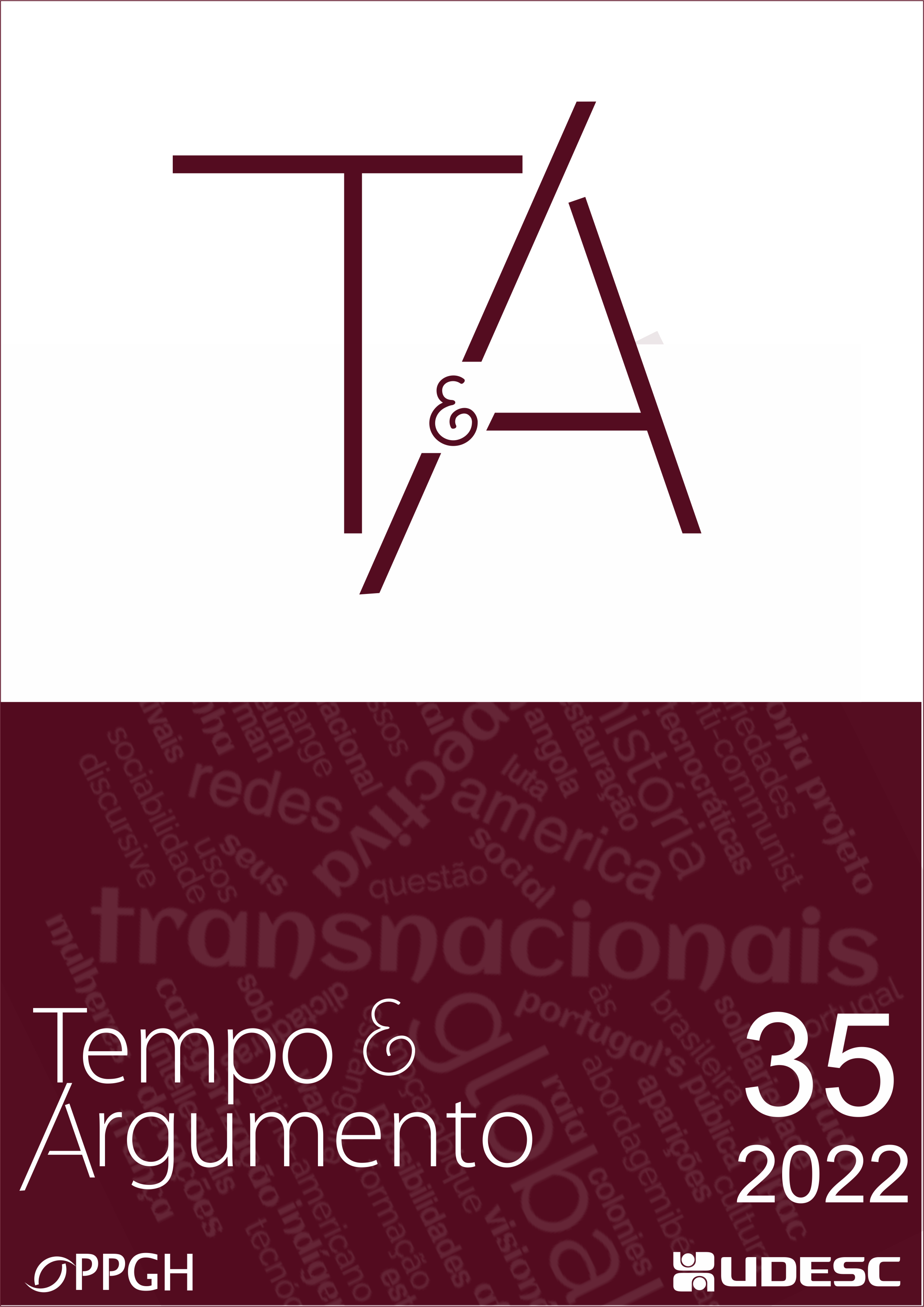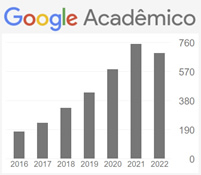Imbalance of stories part II: an initiative around a problem
DOI:
https://doi.org/10.5965/2175180314352022e0301Abstract
This paper aims to explore some methodological issues discussed in the first article of the series “The imbalance of stories part I” (TÉO, 2018), based on the trajectory of Diva Inclusive Solutions, an initiative founded by the author. The text describes the process of constitution around the problem that gives the title to the two articles, as well as some of the solutions created to fight it, to finally propose possible readings regarding the entry of professionals in the field of humanities in other instances beyond teaching and academic research.
Keywords: market; empathy; diversity; technology; unbalance of stories.
Downloads
References
ACHEBE, Chinua. Home and exile. New York: Oxford University Press, 2000a.
ACHEBE, Chinua. Africa: balancing stories. Fidelio, Washington, DC, v. 9, n. 2-3, p. 128-129, Summer-Fall 2000b.
ADICHIE, Chimamanda Ngozi. O perigo da história única. São Paulo: Companhia das Letras, 2019.
ARAÚJO, Valdei. O direito à história: o(a) historiador(a) como curador(a) de uma experiência histórica socialmente distribuída. In: GUIMARÃES, Géssica; BRUNO, Leonardo; PEREZ, Rodrigo. Conversas sobre o Brasil: ensaios de crítica histórica. Rio de Janeiro: Autografia, 2017. p. 191-216.
BORIN, Fernanda; FIENO, Priscila; SAMPAIO, Bernardo. Diversidade: inclusão ou estratégia. Harvard Business Review Brasil, São Paulo, out. 2015.
BULGARELLI, Reinaldo. Diversos somos todos: valorização, promoção e gestão da diversidade nas organizações. São Paulo: Editora de Cultura, 2008.
CAMILO, Juliana; FORTIM, Ivelise; AGUERRE, Pedro (orgs.). Gestão de pessoas: práticas de gestão da diversidade nas organizações. São Paulo: Editora Senac, 2019.
CASTRO-GÓMEZ, Santiago; GROSFOGUEL, Ramón (eds.). El giro decolonial: reflexiones para una diversidad epistémica más allá del capitalismo global. Bogotá: Siglo del Hombre Editores, 2007.
CROLL, Alistair; YOSKOVITZ, Benjamin. Lean analytics: use data to build a better startup faster. Sebastopol, CA: O’Reilly Media, 2013.
DE WAAL, Franz. A era da empatia: lições da natureza para uma sociedade mais gentil. São Paulo: Companhia das Letras, 2010.
EUBANKS, Virginia. Automating inequality: how high-tech tools profile, police, and punish the poor. New York: Picador, 2019.
FINN, Ed. What algorithms want: imagination in the age of computing. Cambridge: MIT Press, 2017.
GERDES, Karen E.; SEGAL, Elizabeth A. A social work model of empathy. Advances in Social Work, Indianápolis: Indiana University School of Social Work, v. 10, n. 2, p. 114-127, 2009. Disponível em: https://journals.iupui.edu/index.php/advancesinsocialwork/article/view/235. Acesso em: 28 fev. 2022.
GORDON, Mary. Roots of empathy: changing the world child by child. New York: The Experiment, 2009.
GÖRLACH, Alexander. Homo empathicus: on scapegoats, populists and saving democracy. Washington, DC: Brookings Institution Press, 2021.
GOTHELF, Jeff. Lean UX: applying lean principles to improve user experience. Sebastopol, CA: O’Reilly Media, 2013.
GOTTSCHALL, Jonathan. The storytelling animal: how stories make us human. Boston: Mariner Books, 2012.
HUMBLE, Jes; MOLESKY, Joanne; O’REILLY, Barry. Lean Enterprise: how high performance organizations innovate at scale. Sebastopol, CA: O’Reilly Media, 2015.
HUNT, Vivian; LAYTON, Dennis; PRINCE, Sara. Diversity matters. [S.I.]: Mackinsey & Company, fev. 2015. Disponível em: https://www.mckinsey.com/business-functions/people-and-organizational-performance/our-insights/why-diversity-matters. Acesso em: 28 fev. 2022.
HUSSERL, Edmund. Meditações cartesianas: introdução à fenomenologia. São Paulo: Editora Madras, 2001.
ISMAIL, Salim. Organizações exponenciais. São Paulo: HSM Editora, 2015.
JAIME, Pedro. Executivos negros: racismo e diversidade no mundo empresarial. São Paulo: EDUSP, 2016.
KRZNARIC, Roman. Como encontrar o trabalho da sua vida. Rio de Janeiro: Objetiva, 2012.
KRZNARIC, Roman. Sobre a arte de viver: lições da história para uma vida melhor. Rio de Janeiro: Zahar, 2013.
KRZNARIC, Roman. O poder da empatia: a arte de se colocar no lugar do outro para transformar o mundo. Rio de Janeiro: Zahar, 2015.
KRZNARIC, Roman. Carpe diem: resgatando a arte de aproveitar a vida. Rio de Janeiro: Zahar, 2018.
KRZNARIC, Roman. Como ser um bom ancestral: a arte de pensar o futuro num mundo imediatista. Rio de Janeiro: Zahar, 2021.
LAVILLE, Christian. A guerra de narrativas: debates e ilusões em torno do ensino de história. Revista Brasileira de História, São Paulo, v. 19, n. 38, p. 125-138, 1999.
LIEDTKA, Jeanne. A magia do design thinking. São Paulo: HSM Editora, 2015.
LYONS, Charles. Suicides spread through a Brazilian tribe. The New York Times, New York, Jan. 2, 2015. Disponível em: https://www.nytimes.com/2015/01/04/opinion/sunday/suicides-spread-through-a-brazilian-tribe.html. Acesso em: 28 fev. 2022.
MACMILLAN, Margareth. Usos e abusos da história. Rio de Janeiro: Record, 2010.
MALDONADO-TORRES, Nelson. Rousseau and Fanon on inequality and the human sciences. In: GORDON, Jane; ROBERTS, Neil (eds.). Creolizing Rousseau. London: Rowman & Littlefield, 2015. p. 121-142.
MALDONADO-TORRES, Nelson. Pensamiento crítico desde la sub-alteridad: los estudios étnicos como ciencias descoloniales o hacia la transformación de las humanidades y las conciencias sociales en el siglo veintiuno. Revista Interamericana de Educación de Adultos [s.I.]: 2006, 28(1), 143-165. Disponível em: https://www.redalyc.org/articulo.oa?id=457545365008. Acesso: 28 fev. 2022.
MANNEY, Patricia J. Empathy in the time of technology: how storytelling is the key to empathy. Journal of Evolution and Technology, [s. I.], v. 19, Issue 1, p. 51-61, Sept. 2008. Disponível em: https://jetpress.org/v19/manney.htm#:~:text=In%20theory%2C%20sensory%2Fmedia%20input,social%2Fcultural%20liberalization%20and%20change. Acesso em: 28 fev. 2022.
MAURYA, Ash. Running lean: iterate from a plan A to a plan that works. Sebastopol, CA: O’Reilly Media, 2012.
McCRACKEN, Grant. Chief culture office: como a cultura pode determinar o sucesso ou o fracasso de uma organização. São Paulo: Aleph, 2011.
NUNES, Paulo Rogério. Oportunidades invisíveis: aprenda a inovar com empresas que apostam na diversidade e geram riqueza. São Paulo: Matrix, 2019.
O'NEIL, Cathy. Algoritmos de destruição em massa: como o big data aumenta a desigualdade e ameaça a democracia. Santo André: Editora Rua do Sabão, 2020.
NOBLE, Safiya Umoja. Algorithms of oppression: how search engines reinforce racism. New York: New York University Press, 2018.
PARISER, Eli. The filter bubble: what the internet is hiding from you. New York: Penguin Press, 2011.
WAL, Jessika ter. Racism and cultural diversity in the mass media: an overview of research and examples of good practice in the EU Member States, 1995-2000 on behalf of the European Monitoring Centre on Racism and Xenophobia, Vienna (EUMC). Viena: European Union Agency for Fundamental Rights; European Research Centre on Migration and Ethnic Relations (ERCOMER), 2002. Disponível em: https://fra.europa.eu/en/publication/2002/racism-and-cultural-diversity-mass-media. Acesso em: 28 fev. 2022.
RIES, Eric. A startup enxuta: como os empreendedores atuais utilizam a inovação contínua para criar empresas extremamente bem-sucedidas. São Paulo: Editores J, 2012.
RIFKIN, Jeremy. The empathic civilization: the race to global consciousness in a world in crisis. Cambridge: Polity, 2010.
SAFFO, P. Farewell information, it’s the media age. saffo.com, [s. I.], 2005. Disponível em: http://saffo.com/wp-content/uploads/2012/01/essay_farewellinfo.pdf. Acesso em: 28 fev. 2022.
STEIN, Edith. On the problem of empathy. Washington: ICS Publications, 1989.
TÉO, Marcelo. Desequilíbrio de histórias parte I: um problema do campo das humanidades (?). Tempo e Argumento, Florianópolis, v. 10, n. 23, p. 358 ‐ 380, jan./mar. 2018. Disponível em: https://revistas.udesc.br/index.php/tempo/article/view/2175180310232018358. Acesso em: 28 fev. 2022.
TÉO, Marcelo. Armas de destruição matemática: a era dos algoritmos. Diva Journal, [s. I.], jul. 2021a. Coluna Break The Bubble. Disponível em: http://divainclusive.com/armas-de-destruicao-matematica-a-era-dos-algoritmos/. Acesso em: 28 fev. 2022.
TÉO, Marcelo. O impacto das tecnologias na proliferação do extremismo. Diva Journal, [s. I.], ago. 2021b. Coluna Break The Bubble. Disponível em: http://divainclusive.com/o-impacto-das-tecnologias-na-proliferacao-do-extremismo/. Acesso em: 28 fev. 2022.
LIETZ, Cynthia A.; GERDES, Karen E.; SUN, Fei.; GEIGER, Jennifer Mullins; WAGAMAN, M. Alex; SEGAL, Elizabeth A. The Empathy Assessment Index (EAI): a confirmatory factor analysis of a multidimensional model of empathy. Journal of the Society for Social Work and Research, Tempe: Arizona State University, v. 2, Issue 2, p. 104-124, 2011. Disponível em: https://www.journals.uchicago.edu/doi/10.5243/jsswr.2011.6. Acesso em: 28 fev. 2022.
THE OPPORTUNITY AGENDA. Media representations and impact on the lives of black men and boys. Social Science Literature Review, New York, Oct. 2011. Disponível em: https://www.opportunityagenda.org/explore/resources-publications/social-science-literature-review. Acesso em: 28 fev. 2022.
TUFEKCI, Zeynep.Twitter and tear gas: the power and fragility of networked protest. New Heaven: Yale University Press, 2017.
Downloads
Published
How to Cite
Issue
Section
License
Copyright (c) 2022 Tempo e Argumento

This work is licensed under a Creative Commons Attribution-NonCommercial 4.0 International License.
The articles published by the magazine are for free use, destined for educational purposes and not commercial. The copyrights are all granted to the magazine. The articles whose authors are identified represent the expressed opinion of its authors and not the official position of the Tempo e Argumento magazine or of the Postgraduate Program in History of the Universidade do Estado de Santa Catarina.




